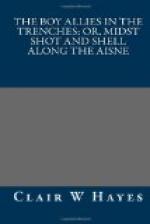“Up and into the bushes!” cried Hal.
A moment and the British were screened from the fire of the enemy on the opposite side of the road, while from their shelter they poured a fire in the direction of rifle flashes across the highway.
Peering from behind the small tree where he had taken shelter, Chester saw a prostrate form in the middle of the road. He thought he recognized it but was not sure. He turned and called to Hal:
“Is Stubbs with you?”
“No,” was the reply. “Where is he?”
“I’ll have him in a minute,” was Chester’s brief response.
Throwing himself to the ground, he crawled from behind his shelter and wormed his way along the ground toward the prostrate form in the road, the figure of Stubbs.
The war correspondent lay as though dead, making no move. The lad, keeping as close to the ground as possible, so as to avoid the German bullets flying overhead, drew closer; and, while the lad did not know it, three other forms also were approaching closely in spite of the hail of lead.
But these latter were making their way through the tree-tops, jumping lightly from bough to bough. Silent as shadows they were, but their eyes glared a fiery red and their tails switched angrily.
They were cats.
Half-starved as they were, they had trailed the troop. They had been in the war zone long enough for their feline intelligence to tell them that where men rode there was likely to be food. More than one dead man, left dead upon the field, had fallen a victim to their claws and teeth.
So now, as Chester crept toward the inert form of the war correspondent, the cats, not perceiving this new enemy—so intent were they upon the body of Stubbs—also approached quietly. Two of the animals were now directly above the body of Stubbs, and stood switching their tails on the limb of a large tree that overhung the roadway. The third was close behind.
Snarling, with bared claws and outstretched legs, the first cat leaped. In a moment the others followed.
Stubbs had been lying upon his face, and all three of the hungry animals lighted squarely upon his back. Instantly the war correspondent lost all resemblance to a dead man, and the man and cats became a panting, struggling, rolling heap.
As Stubbs cried out in alarm, Chester—still some distance away—raised his head and quickly realized the struggle that was taking place. Throwing caution to the winds, he sprang to his feet and with a shout charged the feline foes.
The war correspondent was fighting off his biting, clawing assailants as best he could; but the very fact that the cats clung to his back was a point in their favor. One buried its sharp teeth in the back of Stubbs’s neck and the war correspondent raised a howl of anguish.
As if by magic now the firing from the Germans’ side of the road ceased. Hal was unaware of the reason for this, but, suspecting a ruse, he ordered his men to cease firing also until he could determine the cause of the enemy’s unexpected silence.




